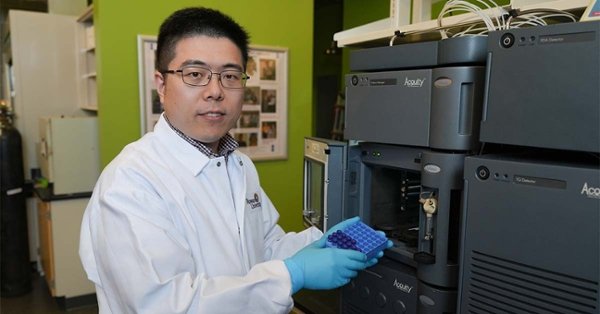New Jersey Health Foundation awards 20 new grants Rowan projects
New Jersey Health Foundation awards 20 new grants Rowan projects

“Forever chemicals”—a group of chemicals known as perfluoroalkyl and polyfluoroalkyl substances (PFAS)—have dominated news headlines because they do not break down in the body or the environment. According to the Centers for Disease Control & Prevention, PFAS are associated with certain adverse health effects, including kidney and testicular cancer. PFAS have been detected in local lakes and rivers, including the Delaware River, as well as in drinking water and freshwater fish across the country.
With support from New Jersey Health Foundation (NJHF), Zhiming Zhang, Ph.D., is studying the efficacy of a process for removing PFAS from stormwater runoff.
The study is one of 20 new, Rowan-led projects funded by NJHF in 2024—the largest number of awards given in a single year from the foundation to Rowan University. In total, Rowan received more than $800,000 in new awards from NJHF, which supports research, community health and social service programs at New Jersey institutions each year.
There are multiple ways PFAS can get into water systems, including discharge from industrial facilities, usage of firefighting foams to put out fires, and stormwater runoff generated from rain and snowmelt, noted Zhang, an assistant professor of environmental engineering in the Henry M. Rowan College of Engineering.
To remove them, Zhang and his team will first analyze stormwater samples to understand the baseline amount of PFAS in stormwater runoff. Then, they will test the process for removing PFAS from stormwater runoff using adsorption materials that can bond with PFAS, thus removing the forever chemicals from stormwater.
“We will repurpose an industrial solid waste—drinking water treatment residuals that are generated during conventional drinking water treatment processes—to remove the PFAS compounds from stormwater through adsorption processes,” Zhang said. “Instead of being landfilled, the proposed treatment process gives drinking water treatment residuals a second life, a great practice towards sustainability.”
The technology proposed by Zhang can be used in field applications, such as storm-drain catch basins. Much like a filter, a bag containing the repurposed drinking water treatment residuals can be put into catch basins. When stormwater runoff flows into the catch basins, contaminants like PFAS compounds can be adsorbed and removed from the stormwater discharge, reducing the amount of PFAS in surface water systems.
Other NJHF grants awarded to Rowan include:
- Plasmalogen Precursor Supplements as a Potential Treatment for Traumatic Brain Injury, Nimish Acharya, New Jersey Institute for Successful Aging;
- The Transcend, Heal, Respond, InnoVate & Empower (THRIVE) Center, Rachel Silliman Cohen, Child Abuse Research Education & Service Institute;
- A Recombinant Soluble Human Podoplanin Receptor to Combat Cancer, Gary Goldberg, Molecular Biology;
- OPA Warehouse Mapping, John Hasse, Geography, Planning & Sustainability;
- How Students Navigate Engineering with Non-Apparent Disabilities, Cassandra Jamison, Experiential Engineering Education Department;
- Design and Pilot Testing of an FHIR-compatible Electronic Recovery Support Record System for Peer Recovery Coaches, Richard Jermyn, Rehabilitation Medicine;
- Novel Therapeutic Agents for the Treatment of Triple Negative Breast Cancer, Subash Jonnalagadda, Chemistry & Biochemistry;
- Developing and Analyzing Antiviral Compounds from Honey Bee Venom, Claude Krummenacher, Biomedical & Biological Sciences;
- Camp Abilities NJ: A Community Health Initiative, Maria Lepore-Stevens, STEAM Education;
- Revolutionizing Ocular Health: Smart pH-Sensitive Contact Lenses for Precision Drug Delivery on Demand, Ping Lu, Chemistry & Biochemistry;
- All-Star Youth Sports Clinic for Children with Disabilities Led by Medical Student Coaches to Improve Child Health and Build Trusting Relationships with Future Physicians; Dean Micciche, Academic Affairs, Rowan-Virtua School of Osteopathic Medicine;
- Diagnostic Markers for Irritable Bowel Syndrome (IBS); Sangita Phadtare, Biomedical Science;
- Data-Driven Glioma Treatment: Harnessing Machine Learning for Personalized Design of CAR T-Cell Immunotherapy; Mary Staehle, Biomedical Engineering;
- Evaluating Efficacy Of Injectable Bmp2 Peptide Hydrogels in Healing Non-Union Femur Fractures; Sebastian Vega, Biomedical Engineering;
- Mechanism of Enzyme Regulation by Magnesium; Brian Weiser, Molecular Biology;
- Milk Matters: The Breastfeeding Curriculum for Rising Health Care Professionals; Deborah Williams, Academic Affairs;
- Optimization of a Novel HDAC6 Selective Inhibitor (C4) for Treating Triple-Negative Breast Cancer; Chun Wu, Chemistry & Biochemistry;
- Revolutionizing Ocular Health: Smart pH-Sensitive Contact Lenses for Precision Drug Delivery on Demand; Ping Zhang, Biomedical Science;
- Bolstering Community Stakeholders' Awareness, Self-Efficacy, and Outreach to Strengthen Partnerships with and Supports for Immigrant Families of Young Children (Birth - Age 5); Nicole Edwards; Wellness and Inclusive Services in Education.
.